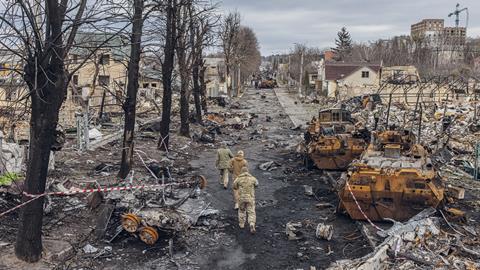As reports of war crimes in Bucha and Mariupol shock the world, a Legal Task Force on Accountability for Crimes Committed in Ukraine has enlisted global legal expertise to fight for justice
A wave of international legal activity has followed this week’s entry of the Ukrainian town of Bucha into the grim list of place names catapulted from obscurity to notoriety by a massacre. However despite efforts to gather evidence and build cases, the likelihood of Russian military commanders – let alone President Putin – standing trial for war crimes remains distant.
In one significant move, Ukraine’s prosecutor general, Iryna Venediktova, announced the creation of a Legal Task Force on Accountability for Crimes Committed in Ukraine. Its members include high-profile human rights lawyers, including the UK former Supreme Court president Lord Neuberger and Baroness Kennedy, director of the International Bar Association’s Human Rights Institute.
The task force’s remit will include advising on proposals for accountability including through the United Nations and regional organisations; advice and potential representation relating to civil and criminal cases (including under universal jurisdiction laws) to secure accountability and reparations in national jurisdictions; and strategic guidance on Ukraine’s cooperation with the International Criminal Court.
Experts from US firm Covington & Burling, led by Nikhil Gore, French firm Sygna Partners, led by Luke Vidal, as well as international firm Withers, led by Emma Lindsay, have also joined, the Ukraine government said. The firms are already representing Kyiv, including at the International Court of Justice.
All members of the task force and the supporting lawyers and academics will carry out their work pro bono.
Neuberger said: ‘We must try and ensure that the rule of law prevails and that those responsible for any crimes suffered by the Ukrainian people are made accountable.’
Kennedy added: ‘It is an honour to be of service to the government of Ukraine and its people. The task force is determined to ensure that no impunity is granted for the blatant violations of international law committed by Russia. It is crucial that perpetrators are brought to justice, and victims receive the reparations they deserve. There can be no peace without justice.’
The UK government has already seconded Sir Howard Morrison, a former judge at the International Criminal Court to assist Venediktova build cases.
Commending Venediktova’s ‘capability, fortitude and bravery’, attorney general Suella Braverman MP this week promised further help. ‘The progress made by Ukraine’s prosecutor-general is extraordinary,’ Braverman wrote in The Times yesterday. ‘She and her team have maintained Ukraine’s criminal procedure infrastructure, cataloguing thousands of cases and identifying hundreds of suspects. She has strategically put in place methodical processes by which prosecutors in Ukraine are working with law enforcement agencies on regional investigations. They are doing the most vital, foundational work: interviewing witnesses and victims to collect their evidence right now.’
The Metropolitan Police has already set up a team to gather evidence on war crimes and is understood to be leafleting Ukrainian refugees arriving in the UK inviting them to provide evidence.
'The task force is determined to ensure that no impunity is granted for the blatant violations of international law committed by Russia. It is crucial that perpetrators are brought to justice'
Helena Kennedy QC
In another initiative, the UN Human Rights Council has set up an independent international commission of inquiry mandated to investigate all alleged violations and abuses of human rights and violations of international humanitarian law. It will also collect, consolidate and analyse evidence in order to maximise the possibility of its admissibility in any future legal proceedings.
The International Criminal Court has already begun an investigation, with prosecutor Karim Khan saying that within days of Russia’s invasion his office ‘had already found a reasonable basis to believe crimes within the jurisdiction of the court had been committed, and had identified potential cases that would be admissible’.
One obstacle, however, is the difficulty of bringing Putin or other leaders before a Hague court. Russia left the ICC in 2016, while the International Court of Justice is subject to the United Nations and therefore Russia’s veto.
To fill the gap, more than 50 former world leaders have signed a proposal led by genocide expert Philippe Sands QC to create an international ad hoc tribunal, along the lines of the Nuremberg trials, to act in addition to any ICC proceedings.
Among the backers of Justice for Ukraine are former UK prime ministers Gordon Brown and John Major. Brown said: ‘Now that crimes revealed at Bucha and Mariupol and elsewhere in Ukraine have shocked the world, we must set a clear path that brings Putin to justice.’ For the moment, however, that path is far from clear.





































No comments yet